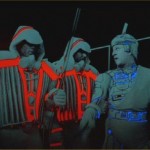Okay, so most of you who follow Diabolical Plots have probably seen Tron, or at least are aware of it. But I wanted to do a quick overview in preparation for the Tron sequel movie coming out next month. Yes, after many years of rumors of a Tron sequel, it looks like it’s actually going to happen this time, with the name Tron Legacy. There have been full fledged previews, larger scale movie promos and the like. It really appears to be happening. I believe the release date planned is just before Christmas 2010. I’m excited to see Tron with modern special effects, and original cast members Jeff Bridges and Bruce Boxleitner are even in the sequel, which is amazing to get them involved in a sequel to a movie 28 years old.
The original movie was released in July 1982. Honestly, I didn’t have much interest in it at the time. This may have had something to do with the fact that I was 6 months old. My brother, however, took it upon himself to ensure that, when I was old enough to appreciate them, I would be well-versed in 80s SF/fantasy movies, including Tron, The Last Starfighter, Flight of the Navigator, and Labyrinth.
Tron was written and directed by Steven Lisberger and was one of the first major studio movies to make extensive use of computer graphics. The graphics are quite dated by now, of course, but when you watch it just keep in mind that these special effects were amazing in 1982. The previews for Tron Legacy, of course, have updated computer graphics, loads of shiny goodness.
Premise
Flynn (Jeff Bridges) is an ex-employee of software corporation ENCOM. Outside of work hours, he was spending his free time developing innovative video games. His fellow developer Ed Dillinger (David Warner) stole his programs and presented them to ENCOM as his own work. ENCOM released the games which rocketed into popularity, especially Flynn’s pride and joy, “Space Paranoids”, earning Dillinger promotion after promotion, all the way up to the head of the company. And eventually Dillinger fired Flynn.
 Now Flynn is on the outside, trying to hack into ENCOM’s network to find evidence of Dillinger’s wrongdoing so that Flynn can prove he’s the real author. But ENCOM’s new super-program, the Master Control Program (MCP) finds the intrusion, and cuts off Flynn’s security clearance. In the process, it also temporarily cuts off clearance to a current employee, Alan Bradley (Bruce Boxleitner), who finds out from Dillinger about the Flynn intrusion. Alan and his girlfriend Lora (Cindy Morgan) go to Flynn and hear his story, and together they decide to sneak into the ENCOM building at night and try to find evidence of the theft.
Now Flynn is on the outside, trying to hack into ENCOM’s network to find evidence of Dillinger’s wrongdoing so that Flynn can prove he’s the real author. But ENCOM’s new super-program, the Master Control Program (MCP) finds the intrusion, and cuts off Flynn’s security clearance. In the process, it also temporarily cuts off clearance to a current employee, Alan Bradley (Bruce Boxleitner), who finds out from Dillinger about the Flynn intrusion. Alan and his girlfriend Lora (Cindy Morgan) go to Flynn and hear his story, and together they decide to sneak into the ENCOM building at night and try to find evidence of the theft.
Once inside, Lora logs into her workstation for Flynn to use, and this is where the main plot really takes off. Her workstation is placed right next to the testing station of her current research project: a new technology that, with a laser and liberal amounts of handwavium, can transport physical objects into a datastream and back out again. While Flynn is doing his thing at the keyboard, the MCP seizes control of the laser and zaps him into ENCOM’s digital universe.
 In the digital space, all of the programs wear the faces of the users who wrote them, but they all wear uniforms that cover their hair and look sort of like body armor. The special effects of this are very interesting. The uniforms and even the faces of the programs are all grayscale, no flesh tones, but the uniforms have neon lines tracing over their contours. The environment is a very simple digitial enviro, much of it being wireframes or simple polygon.
In the digital space, all of the programs wear the faces of the users who wrote them, but they all wear uniforms that cover their hair and look sort of like body armor. The special effects of this are very interesting. The uniforms and even the faces of the programs are all grayscale, no flesh tones, but the uniforms have neon lines tracing over their contours. The environment is a very simple digitial enviro, much of it being wireframes or simple polygon.
Flynn is captured and, along with a group of rebel programs, asked to renounce their belief in the users, who the programs tend to think of as gods. Those who refuse are forced into a gaming arena to fight each other to the death in a variety of games. During a round of the now iconic light cycle game (where the players drive motorcycles that leave solid walls behind them, the objective is to force your opponent to crash into a wall before you do), Flynn escapes the arena along with two other programs. One of those programs is the title character Tron, a security program written by Alan Bradley (and thus also played by Bruce Boxleitner). They team together to try to take down the tyrant that is the MCP.
My Views
This movie deserves credit for being one of a number of successful science fiction movies of the 1980s that helped define science fiction movie fandom. It’s fun, it has Jeff Bridges (who I’ve always liked), and it had a lot of cool ideas. Some of the effects are still pretty cool, like the spinning splendor of the MCP, and much of the work here laid the groundwork for modern special effects. Modern special effects can be a blessing or a curse, as they look very shiny, but are too oftenÂused to replace plot instead of enhance it. But special effects can be a great thing.
That doesn’t meanÂthat Tron isÂwithout its faults. Mostly, the middle of the film just gets a little long, and seems to serve as a showcase for the graphics, but doesn’t provide much in the way of plot. Especially the long, drawn-out chase scene with the MCP’s tanks chasing after our heroes’ light cycles in a long canyon. And in scenes like that, what I really want to know is what part of the computer network that represents. They are supposed to exist inside of the network after all. When one of the tanks falls off a cliff, what does that mean in the structure of a computer: nothing, really. I wish a little more thought had been given to the settings so that they each corresponded to something meaningful in the hardware or software of a computer.
Similarly, even though the characters in the story are supposed to be programs, they’re never particularly convincing as programs. Keep in mind that I may only have this nitpick because I write programs for a living, but programs don’t work that way. These programs look like people, but more than that, they really are little people, only with a different world to live in. This doesn’t really make all that much sense with this world supposedly being a manifestation of a computer network’s interior. In reality, an accounting program can only do accounting, not work together with security programs to infiltrate the MCP. And some of the actions of the programs also don’t really make sense. At one point in the movie Flynn (in the computer) kisses a program written by Lora. His motivations in this are clear, as his love for her is forbidden in the real world because she is with Alan, but what does the exchange mean from her point of view? I could make an obvious joke here about “interfacing”, but I really am curious what a kiss would accomplish/represent/imply to a program’s thinking.
If you’re interested in the development of special effects, see this movie. If you are a hardcore geek, see this movie. It may not be something for everyone, and again, the special effects are very dated, but if you can look past that, you might enjoy this. And I hope that the new movie makes good use of modern special effects without using them as a crutch. I can hope!

